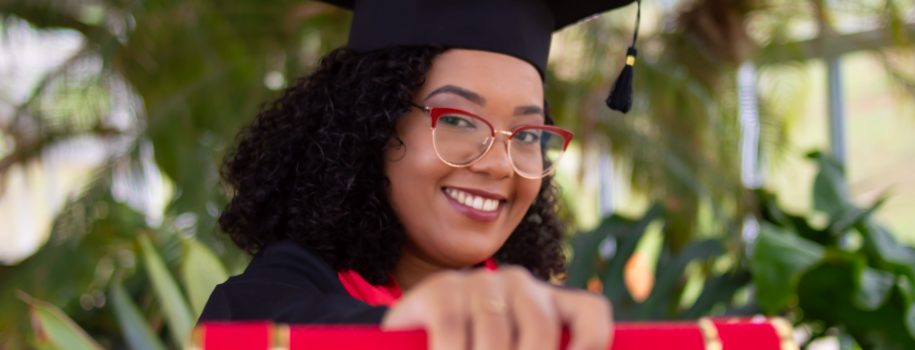
Both institutions are SAGE subscribers and received the Athena Swan Bronze Award in September 2019.
Times Higher Education (THE) releases their University Impact Rankings every April. Since 2019, THE has produced a ranking focusing on how universities are contributing to gender equality, in line with the United Nations Sustainable Development Goal 5.
Universities are ranked according to a THE-specific methodology which is based on metrics including research output, the proportion of first-generation female students, senior female academics, student access measures and women’s progress measures.
Australian universities in the top 30 for gender equality in 2020 include:
- La Trobe University (1st)
- Western Sydney University (2nd)
- Charles Sturt University (6th)
- University of Sydney (18th)
- University of Canberra (20th)
- Edith Cowan University, Australian Catholic University (equal 21st)
- Monash University, Charles Darwin University (equal 24th)
- University of Wollongong (28th)
The following list features examples of gender equity, diversity and inclusion initiatives from eight SAGE subscriber universities. The examples are sourced from the institutions’ respective SAGE applications for Athena Swan Bronze Awards.
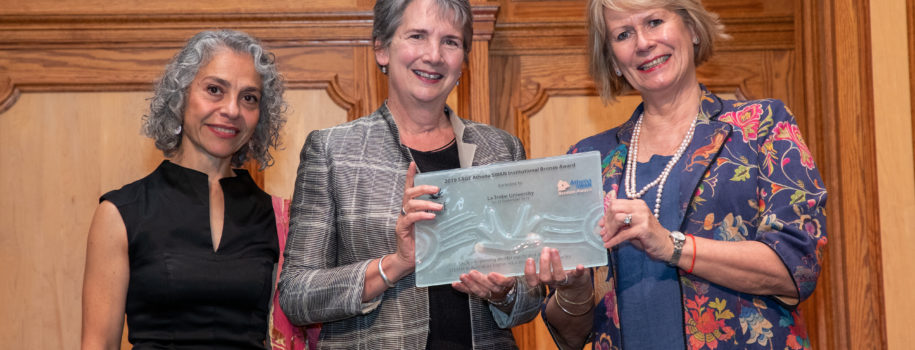 La Trobe University receiving their Athena Swan Bronze Award at the 2020 SAGE Awards Dinner, held at Adelaide Town Hall. Photograph: Tom Carruthers
La Trobe University receiving their Athena Swan Bronze Award at the 2020 SAGE Awards Dinner, held at Adelaide Town Hall. Photograph: Tom Carruthers
La Trobe University (ranked 1st by THE)
La Trobe’s inclusive gender scope is evident from many of their gender equity initiatives. Under its Athena Swan Bronze Action Plan, these include:
- The Gender Diversity in Leadership Program, which focuses on developing the leadership potential of high-performing women, women from regional campuses, women in STEM disciplines, and transgender and gender-diverse staff.
- The Women’s Academic Promotions Support (WAPS) program seeks to address the inequality in female academics represented at higher academic levels. The program includes professional development, group mentoring and a dedicated collaborative space.
- The Carers Travel Support Fund to support researchers who are primary carers while presenting at a national or international conference or undertaking research interstate or abroad.
Upon receiving the Athena Swan Bronze Award, La Trobe Vice-Chancellor Professor John Dewar said that “equity and inclusivity sit at the heart of La Trobe’s ethos and core values.” La Trobe has also been noted as an Employer of Choice by the Australian Government’s Workplace Gender Equality Agency (WGEA) for 16 consecutive years.
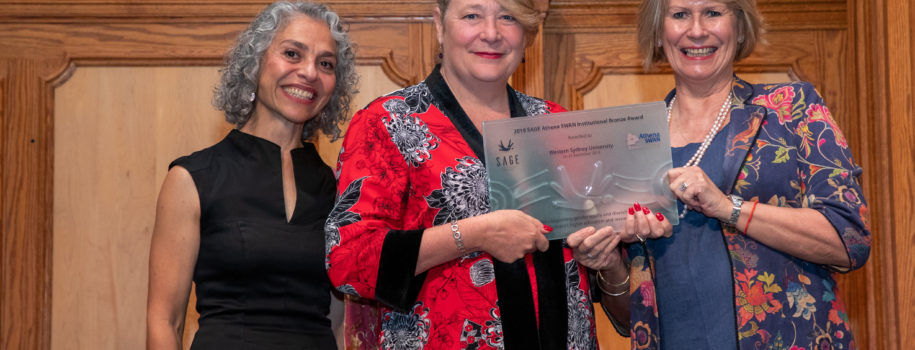 Professor Janice Aldrich-Wright (centre) receiving the Athena Swan Bronze Award on behalf of Western Sydney University at the 2020 SAGE Awards Dinner. Photograph: Tom Carruthers
Professor Janice Aldrich-Wright (centre) receiving the Athena Swan Bronze Award on behalf of Western Sydney University at the 2020 SAGE Awards Dinner. Photograph: Tom Carruthers
Western Sydney University (ranked 2nd by THE)
Western Sydney University was ranked number 1 in the 2019 THE gender equality rankings and has been noted as a WGEA Employer of Choice for 14 consecutive years.
The university’s Athena Swan Bronze Action Plan highlights:
- Implementing Equity and Diversity Working Parties in every School, Institute and Division across the university.
- Additional high school outreach and engagement through new initiatives aimed at increasing girls’ participation in STEMM.
- Increasing the visibility of role models in areas of STEMM that have low female representation through initiatives such as the Women of Wisdom program in Engineering, and the Western Women Transforming the Built Environment network.
- Raising the profile of outstanding early-career STEMM women across the university, through programs such as the Network for Emerging Women.
- Providing additional support and flexibility for staff who are parents and carers, particularly in support of career development.
Professor Denise Kirkpatrick, Senior Deputy Vice-Chancellor, said that the university’s participation in the SAGE Athena Swan program has enriched its approach to furthering gender equity and to leading as a world-class institution.
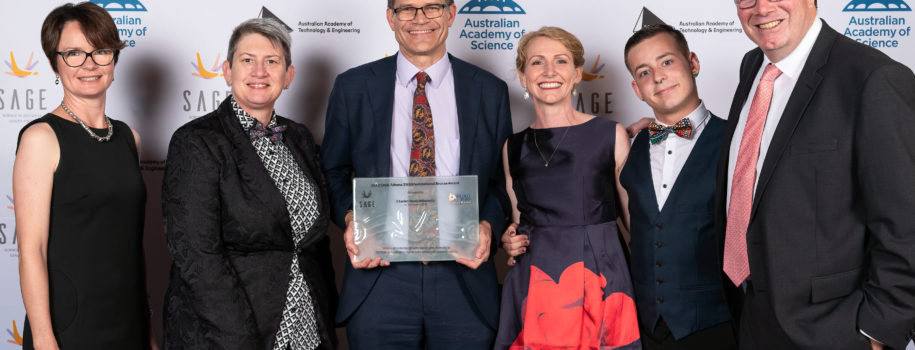 The team from Charles Sturt University with their Athena Swan Bronze Award at the 2018 SAGE Awards Dinner held at Parliament House, Canberra. Photograph: Bradley Cummings
The team from Charles Sturt University with their Athena Swan Bronze Award at the 2018 SAGE Awards Dinner held at Parliament House, Canberra. Photograph: Bradley Cummings
Charles Sturt University (ranked 6th by THE)
Charles Sturt University (CSU), which was awarded the Athena Swan Bronze Award in 2018, includes the following policies in its Athena SwaCSU offers their full-time and part-time employees up to 15 days of paid domestic violence leave, which is well and truly above the 5 days’ unpaid family and domestic violence leave entitlements specified in the National Employment Standards.
n Bronze Action Plan:
- CSU has also piloted a “Return to Research” funding scheme for staff within the Faculty of Science, targeted at staff who have taken a significant career break for reasons such as maternity or paternity leave, extended sick leave, carers’ leave or other circumstances.
CSU Vice-Chancellor and President Professor Andrew Vann said CSU was committed to actions that would not only reduce inequity in STEMM but across the entire institution. “These actions address issues identified in recruitment and induction; career progression and promotion; the gender pay gap; research; leave and flexible work arrangements; promoting inclusivity; and embedding the Athena Swan principles within the university,” said Professor Vann.
CSU has also been noted as an Employer of Choice for 2019–20 by WGEA.
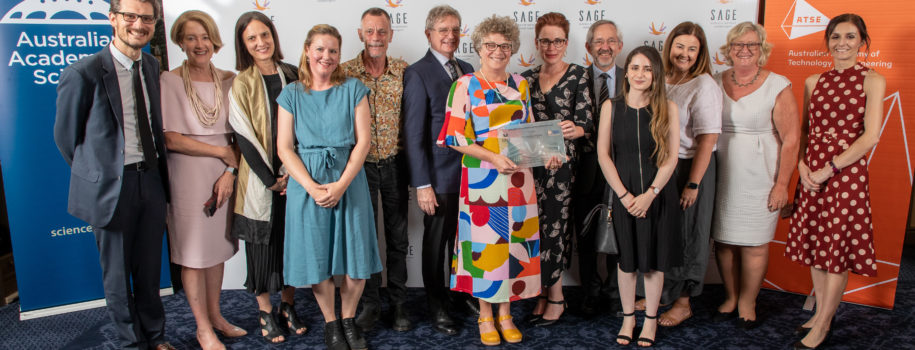 The University of Sydney team pose with their Athena Swan Bronze Award at the 2020 SAGE Awards Dinner. Photograph: Tom Carruthers
The University of Sydney team pose with their Athena Swan Bronze Award at the 2020 SAGE Awards Dinner. Photograph: Tom Carruthers
The University of Sydney (ranked 18th by THE)
The University of Sydney was awarded the Athena Swan Bronze Award in 2019. Key areas highlighted in its Athena Swan Bronze Action Plan include:
- increasing targeted recruitment of women and underrepresented groups at senior academic levels;
- continuing work towards a fair, equitable and transparent promotions process;
- building on the excellent foundation of parental leave available to staff to remove remaining barriers to access and flexibility; and
- continuing to improve workplace behaviours and institutional culture.
- In 2017, the University launched the VC Sponsorship Program for professional/academic female staff who are culturally and linguistically diverse. 50 mentees have been through the program where they are partnered with a senior leader and participate in career development/networking activities.
“During the SAGE process, which has been strategically supported and championed by the university’s senior leadership, we have developed and will implement an ambitious four-year, data-driven Action Plan to improve workplace culture for all staff,” said Professor Renae Ryan from the School of Medical Sciences and Academic Director of SAGE at the University of Sydney.
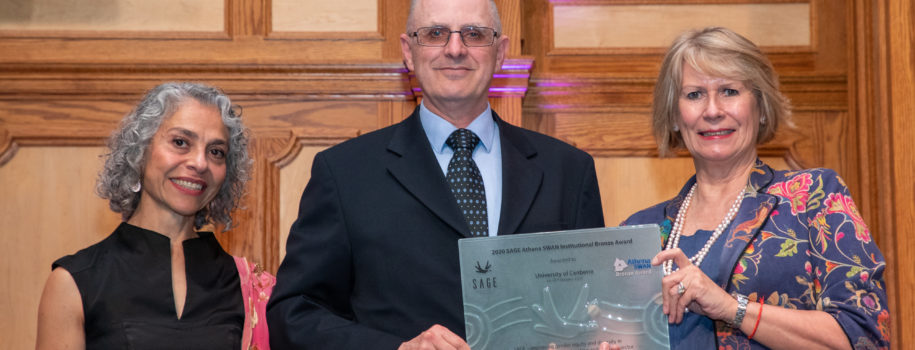 Professor Geoff Crisp (centre) receiving the University of Canberra’s Athena Swan Bronze Award at the 2020 SAGE Awards Dinner. Photograph: Tom Carruthers
Professor Geoff Crisp (centre) receiving the University of Canberra’s Athena Swan Bronze Award at the 2020 SAGE Awards Dinner. Photograph: Tom Carruthers
The University of Canberra (ranked 20th by THE)
The University of Canberra (UC) received the Athena Swan Bronze Award in February 2020. Deputy Vice-Chancellor & Vice-President Academic Professor Geoff Crisp said that UC is committed to creating a more inclusive and supportive workplace and community.
“The University of Canberra has had great success in the gender equality area. We are going to continue to focus on improving the number of women in STEMM by further normalising career breaks, the parental care responsibility for men and women, and flexible working arrangements,” said Professor Crisp.
UC is currently working on initiatives such as improving the workload manageability of staff who undertake additional outreach/mentoring/committee responsibilities in service of an underrepresented group that they belong to (e.g. women in IT, men in midwifery).
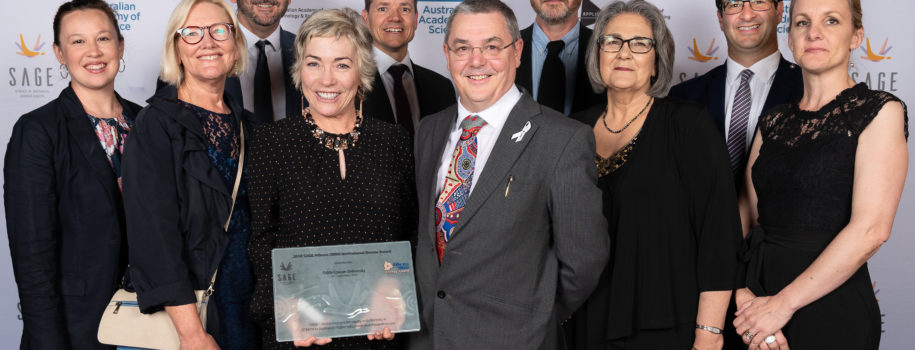 The team from Edith Cowan University posing with their Athena Swan Bronze Award at the 2018 SAGE Awards Dinner. Photograph: Bradley Cummings
The team from Edith Cowan University posing with their Athena Swan Bronze Award at the 2018 SAGE Awards Dinner. Photograph: Bradley Cummings
Edith Cowan University (ranked equal 21st by THE)
Edith Cowan University (ECU) received the Athena Swan Bronze Award in December 2018 and has been noted as an Employer of Choice by WGEA for 7 consecutive years.
A snapshot of initiatives featured in its Athena Swan Bronze Action Plan include:
- ECU recruits senior academic leaders via their Professorial Research Fellowship Program. Recognising the need to increase women’s representation in their Professoriate, future Fellowships will identify and target female candidates across all disciplines.
- The university is also working on strengthening their attraction of women more broadly. To encourage more women to apply for positions in the Schools of Engineering and Science, all promotional materials, job advertisements and information packs for applicants will feature gender neutral language, non-stereotypical images, visible female role models and incorporate ECU’s gender diversity commitment.
- Acknowledging that women’s experiences are also shaped by their cultural identities, ECU’s Reconciliation Action Plan 2018-21 will incorporate gender reporting requirements to identify the unique intersecting barriers experienced by Aboriginal women.
- ECU also offers a range of support schemes and achievement recognition programs through its Edith Cowan Athena SWAN Advancement Scheme. These include professional development/travel subsidies to support those with parenting and caring roles, and the Kick-Start Science Prize, which boosts the career progression of academics after career breaks.
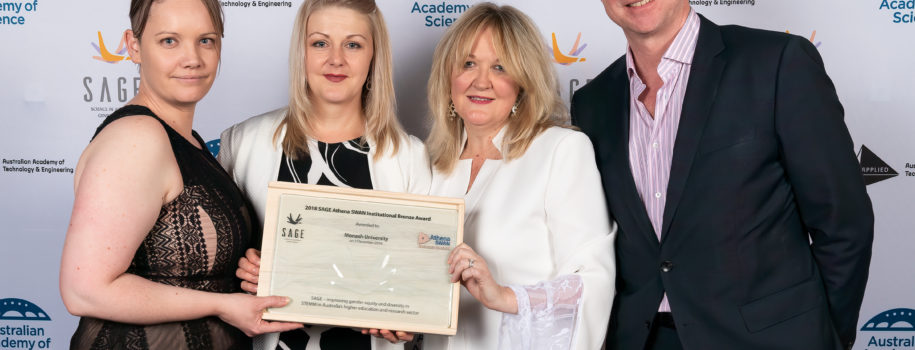 The team from Monash University received their Athena Swan Bronze Award at the 2018 SAGE Awards Dinner. Photograph: Bradley Cummings
The team from Monash University received their Athena Swan Bronze Award at the 2018 SAGE Awards Dinner. Photograph: Bradley Cummings
Monash University (ranked equal 24th by THE)
Monash University, which was awarded the Athena Swan Bronze Award in December 2018, is progressing its Athena Swan Bronze Action Plan with a range of initiatives, including:
- STEMM departments at Monash will hold staff meetings, planning days/retreats, seminars and social gatherings during family-friendly hours in order to be inclusive of as many staff as possible. (Specific goals are for> 80% of staff reporting that they can attend meetings, and >70% reporting that they can attend socials/retreats)
- Each STEMM faculty will also introduce a formal internal succession plan that identifies future female leaders and supports their participation in senior-level decision-making.
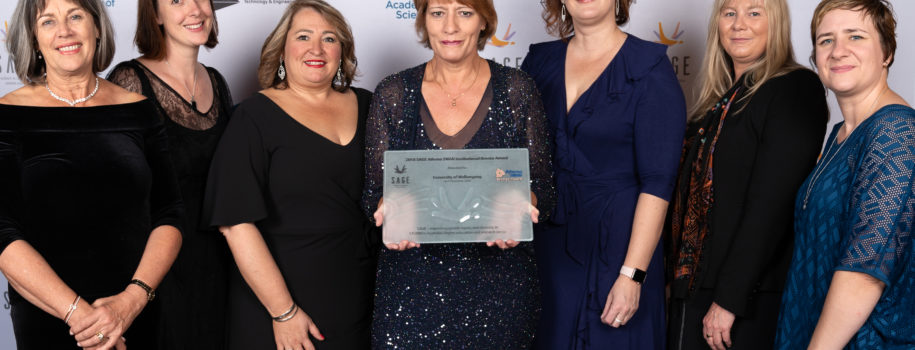 The team from the University of Wollongong with their Athena Swan Bronze Award at the 2018 SAGE Awards Dinner. Photograph: Bradley Cummings
The team from the University of Wollongong with their Athena Swan Bronze Award at the 2018 SAGE Awards Dinner. Photograph: Bradley Cummings
University of Wollongong (ranked 28th by THE)
The University of Wollongong was awarded the Athena Swan Bronze Award in December 2018 and has implemented a number of initiatives to enhance gender equality, including flexible work arrangements, generous paid parental leave, on-campus childcare facilities, mentoring workshops, and targeted development programs.
The university has been noted as an Employer of Choice by WGEA for 11 consecutive years. Its Action Plan includes the following policies:
- As part of its efforts to create inclusive spaces for transgender staff and students, the university introduced a non-gendered toilet on campus in 2017. They are currently developing recommendations for facilities management to include non-gendered toilets in new building works and relabel existing toilet facilities.
- For STEMM Level D/E and Heads of School recruitment, the university has committed to mandating the identification of women applicants for these positions, as well as increasing the number of women on longlists and shortlists.



